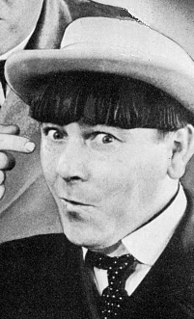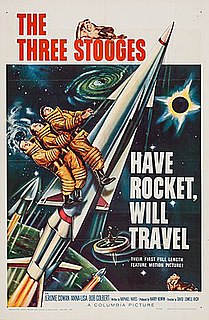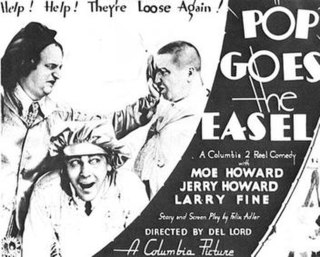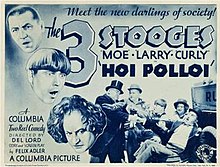
The Three Stooges was an American vaudeville and comedy team active from 1922 until 1970, best remembered for their 190 short subject films by Columbia Pictures. Their hallmark styles were physical farce and slapstick. Six Stooges appeared over the act's run : Moe Howard and Larry Fine were mainstays throughout the ensemble's nearly 50-year run and the pivotal "third stooge" was played by Shemp Howard, Curly Howard, Shemp Howard again, Joe Besser, and "Curly Joe" DeRita.

Moses Harry Horwitz, known professionally as Moe Howard, was an American comedian and actor. He is best known as the leader of The Three Stooges, the farce comedy team who starred in motion pictures and television for four decades. That group initially started out as Ted Healy and His Stooges, an act that toured the vaudeville circuit. Moe's distinctive hairstyle came about when he was a boy and cut off his curls with a pair of scissors, producing an irregular shape approximating a bowl cut.

Jerome Lester Horwitz, known professionally as Curly Howard, was an American vaudevillian comedian and actor. He was best known as a member of the American comedy team the Three Stooges, which also featured his elder brothers Moe and Shemp Howard and actor Larry Fine. In early shorts, he was billed as Curley. Curly Howard was generally considered the most popular and recognizable of the Stooges. He was well known for his high-pitched voice and vocal expressions, as well as his physical comedy, improvisations, and athleticism. An untrained actor, Curly borrowed the "woob woob" from "nervous" and soft-spoken comedian Hugh Herbert. Curly's unique version of "woob-woob-woob" was firmly established by the time of the Stooges' second Columbia film, Punch Drunks (1934).

Joseph Wardell, known professionally as Joe DeRita, was an American actor and comedian, who is best known for his stint as a member of The Three Stooges in the persona of Curly Joe DeRita.

Have Rocket, Will Travel is a 1959 American science fiction comedy film starring The Three Stooges. By this time, the trio consisted of Moe Howard, Larry Fine, and new "third Stooge" Joe DeRita. Released by Columbia Pictures, the feature was produced to capitalize on the comedy trio's late 1950s resurgence in popularity. The picture's supporting cast features Anna-Lisa and Robert Colbert.

Half-Wits Holiday is a 1947 short subject directed by Jules White starring American slapstick comedy team the Three Stooges. It is the 97th entry in the series released by Columbia Pictures starring the comedians, who released 190 shorts for the studio between 1934 and 1959.

Woman Haters is a 1934 musical short subject directed by Archie Gottler starring American slapstick comedy team The Three Stooges. It is the inaugural entry in the series released by Columbia Pictures starring the comedians, who would ultimately star in 190 short subjects for the studio between 1934 and 1959. This short is known to be the first program shown on Antenna TV, a channel that was launched on January 1, 2011, by Tribune Broadcasting.

Rhythm and Weep is a 1946 short subject directed by Jules White starring American slapstick comedy team The Three Stooges. It is the 95th entry in the series released by Columbia Pictures starring the comedians, who released 190 shorts for the studio between 1934 and 1959.

Pop Goes the Easel is a 1935 short subject directed by Del Lord starring American slapstick comedy team The Three Stooges. It is the seventh entry in the series released by Columbia Pictures starring the comedians, who released 190 shorts for the studio between 1934 and 1959.

Pardon My Scotch is a 1935 short subject directed by Del Lord starring American slapstick comedy team The Three Stooges. It is the ninth entry in the series released by Columbia Pictures starring the comedians, who appeared in 190 shorts at the studio between 1934 and 1959.

An Ache in Every Stake is a 1941 short subject directed by Del Lord starring American slapstick comedy team The Three Stooges. It is the 57th entry in the series released by Columbia Pictures starring the comedians, who released 190 shorts for the studio between 1934 and 1959.

Half Shot Shooters is a 1936 short subject directed by Preston Black starring American slapstick comedy team The Three Stooges. It is the 14th entry in the series released by Columbia Pictures starring the comedians, who released 190 shorts for the studio between 1934 and 1959.

They Stooge to Conga is a 1943 short subject directed by Del Lord starring American slapstick comedy team The Three Stooges. It is the 67th entry in the series released by Columbia Pictures starring the comedians, who released 190 shorts for the studio between 1934 and 1959.

Three Little Sew and Sews is a 1939 short subject directed by Del Lord starring American slapstick comedy team The Three Stooges. It is the 36th entry in the series released by Columbia Pictures starring the comedians, who released 190 shorts for the studio between 1934 and 1959.

In the Sweet Pie and Pie is a 1941 short subject directed by Jules White starring American slapstick comedy team The Three Stooges. It is the 58th entry in the series released by Columbia Pictures starring the comedians, who released 190 shorts for the studio between 1934 and 1959.

A Bird in the Head is a 1946 short subject directed by Edward Bernds starring American slapstick comedy team The Three Stooges. It is the 89th entry in the series released by Columbia Pictures starring the comedians, who released 190 shorts for the studio between 1934 and 1959.

Pies and Guys is a 1958 short subject directed by Jules White starring American slapstick comedy team The Three Stooges. It is the 185th entry in the series released by Columbia Pictures starring the comedians, who released 190 shorts for the studio between 1934 and 1959.

Three Little Pirates is a 1946 short subject directed by Edward Bernds starring American slapstick comedy team The Three Stooges. It is the 96th entry in the series released by Columbia Pictures starring the comedians, who released 190 shorts for the studio between 1934 and 1959.

Hugs and Mugs is a 1950 short subject directed by Jules White starring American slapstick comedy team The Three Stooges. It is the 121st entry in the series released by Columbia Pictures starring the comedians, who released 190 shorts for the studio between 1934 and 1959.

Three Stooges Scrapbook is an unaired 1960 television pilot starring The Three Stooges. In the opening title and Hollywood trade ads, the show's title is spelled without "The," including a promotional photograph of the Stooges holding an oversized scrapbook. The pilot featured the slapstick trio getting evicted from a rooming house for cooking in their apartment, looking for a new place to live, finding refuge in the home of a mad inventor, and presenting an animated short called The Spain Mutiny that imagines the funnymen as part of Christopher Columbus’ crew.





















